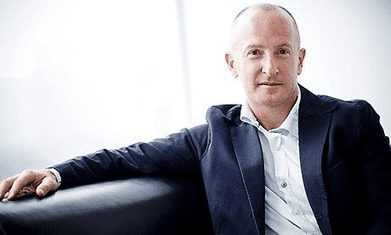Errol Damelin is the sort of name you’ve probably heard before but can’t quite place. Why? Well, throughout much of the early 2000s, Mr Damelin and his brainchild, the online payday loan provider Wonga, were hardly out of the press. Hailed as ‘the first fintech’ and no stranger to the spotlight at its peak the brand eyed a one billion GBP IPO. In 2014, Mr Damelin moved on from the short term lender to pursue other investment opportunities and has built a legacy as one of South Africa’s most successful angel investors.
Given his stratospheric rise, we thought we’d take a closer look at Errol’s career and try to uncover a few of the secrets of his success that we can fold into our own meagre investment portfolios.
Who is Errol Damelin?
Born in Klerksdorp in 1969, Errol Damelin left the largest city in the North West province to study a business and law degree at the University of Cape Town before completing his master’s degree at Boston University. He was then hired by an Israeli investment bank, where he worked in corporate finance.
In 1997, Damelin decided to move into the fast-paced world of startups by founding his first business Barzelan, which made speciality steel wire. Then in 2000, he founded a cloud-based software company called Supply Chain Connect in London, before selling the business in 2005. In 2007, he and fellow South African Jonty Hurwitz founded the payday loan company Wonga in the UK. He won numerous awards for his entrepreneurship and by 2013 the business had revenues of more than £300 million and over 500 employees.
In 2014, perhaps seeing the storm clouds on the horizon, Errol stepped down as the CEO and Director of Wonga, sold his shares in the company and took his next steps as a successful fintech startup investor.
The making of a super angel
Over the last decade, Damelin has set himself up as a prolific angel investor, with investments in more than 50 companies in Europe and around the world. He has a particularly heavy presence in Israel, where his time as a corporate banker has helped him to understand the ecosystem businesses work in.
It’s little surprise that fintech is Damelin’s favoured sector, which is where he had so much success with Wonga. The dozens of fintechs he has invested in over the years include Nested, Habito, Farewill and Tide – a company he incubated from scratch as a cofounder. And it’s in these early stages where Damelin’s real interest lies.
Just recently, Damelin made a reported 9,900% return on his angel investment in Cazoo and Wise. He recently sold his initial £48,000 stake in Wise and £72,000 stake in Cazoo for a combined £11.6 million – a decent ROI in anyone’s book.
Despite his success, Damelin keeps a low profile in the industry, rarely speaking at conferences or events. He also refuses to invest other people’s money by way of a fund. However, this private and enigmatic approach to investing hasn’t harmed Damelin’s standing in the industry and he continues to move from strength to strength with a seemingly Midas touch.
What lessons can we learn from Damelin?
Okay, so the man knows a thing or two about building businesses and investing strategies. We’ve also just discussed his tendency to play his cards very close to his chest so can we learn anything from Damelin to help us develop our own business building / business investment goals? Luckily the answer is yes. Errol Damelin does occasionally go on record to share some tips with the rest of us. This brief interview from over ten years ago still holds plenty of useful gems applicable to the 2022 and beyond landscape.
We’ve taken the liberty of breaking down this interview into some key bullet points for your convenience.
#1) You have to offer something different.
This can be a new product, or an old product that is offered in a new way. The point is to not be just another copycat that offers no unique value as your business will never stand out in a saturated marketplace.
#2) Always be looking for the next disruption
We have a tendency to become comfortable when we have found a business model that works. A business that is profitable and stable is of course highly desirable but we must not let today’s success blinker us from the next big opportunity that could be around the corner. Try to ask yourself ‘how can we make this better / easier for customers?’ If you were a competitor – how would you be trying to get the edge over the current business model?
#3) Seek out customer dissatisfaction
If you can find spaces in the market where there are a lot of customers being left unhappy chances are you’ve found a potential opportunity to disrupt the space and do things better. This is of course easier said than done but it’s not impossible. Sometimes it’s a whole new technology required to reinvent the industry, sometimes it’s a shift in management structure, or a rebrand and updated customer service efforts. The deeper you dig into these types of opportunity you will also realise there are businesses that continue to exist simply because no one else is competing in that space.
#4) Consider scalability from the offset
You can have the best work ethic in the whole world but at the end of the day you’re still only one person with 24 hours in your day. There is a hard ceiling set on business growth unless you find a way to successfully grow and manage your business in a sustainable way. You need to think about how you’re going to scale from day one. It’s hard to let go and trust others. You need robust working processes in place to enable your team to do their job and strong hiring practices to give yourself the best chance of building a team of employees that you trust. This is very difficult, and one of the reasons why there are so many sole traders compared to serial entrepreneurs.







